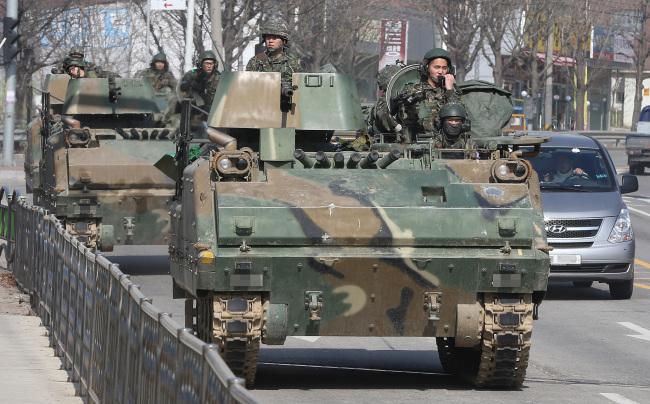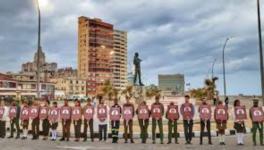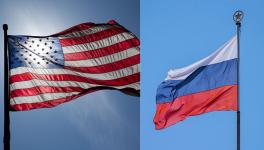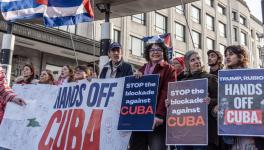Resuming War-games in Korean Peninsula: the Art of Derailing Prospect of Peace

The image is of 2015 joint U.S- Korea exercise. Picture Credits: Yonhap
As the world anxiously watched the tensions between U.S and North Korea dangerously escalating last year, with each side threatening the other with consequences that might include use of nuclear weapons, Donald Trump and South Korean President Moon Jae-in had agreed early this January to postpone the annual joint-military exercises of U.S and South Korea in order to not affect the Winter Olympics and Paralympics hosted in South Korea from February 9 to March 18.
Japanese Prime Minister Shinzo Abe’s insistence during the winter olympics on the importance of conducting the war games without delay was firmly dismissed by Moon Jae-in, who complained that it was inappropriate for the Japanese leader to make such a direct comment as it was a matter of South Korea’s sovereignty.
The ominous clouds looming over the Korean peninsula appeared to be clearing after Kim Yo Jong, on behalf of her brother and North Korean leader Kim Jong Un, invited the South Korean president to Pyongyang on her historic visit to South Korea during the Winter Olympics, whose opening ceremony saw the two divided Koreas march together under a united flag.
Following this event, a ten-member delegation, led by South-Korean National Security advisor, Chung Eui-yong, visited North Korea’s capital earlier this month, where the Supreme leader reportedly expressed his willingness to negotiate the country’s denuclearization with Washington, explaining that North Korea had no reason to have nuclear weapons if the military threats against the country are removed and its security is assured. Kim Jong-un also agreed to meet Moon Jae-in in the month of April, and assured that no nuclear or missile tests will be conducted while the negotiations are underway with U.S, if Washington agrees to talk to him. The world breathed a sigh of relief when Trump responded positively, agreeing to meet Kim by the end May.
However, with the announcement today that the U.S-South Korea annual joint military exercise will be held throughout April - the month when the meeting between the leaders of the North and South Korea is scheduled - the question arises if the high hopes of peace that many had harboured after the apparent diplomatic breakthrough was premature.
A “defensive” war-game?
The first of the exercises, known as Foal Eagle, will involve 11,500 U.S. and 290,000 South Korean troops, which will be followed another computer-simulated exercise called ‘Key Resolve’, involving 12,200 Americans and 10,000 South Korean personnel.
Though, a South Korean envoy has said that Kim Jong-un “understands” the need for U.S and South Korea to engage in such exercise, his claim has not been clarified by any statement made by North Korean officials. Earlier this month, it was made clear by North Korea through its mouth-piece, KCNA, that "if the US finally holds joint military exercises while keeping sanctions”, North Korea will “counter the US by its own mode of counteraction and the US will be made to own all responsibilities for the ensuing consequences".
"Whether peace desired by our nation and the rest of the world settles on the Korean Peninsula or a situation that no one desires is developed in the vicious cycle of confrontation depends entirely on the attitude of the US," a spokesperson of North Korean Foreign Ministry was quoted by KCNA.
Pentagon spokesperson, Lieutenant Colonel Christopher Logan has said, “Our combined exercises are defense-oriented and there is no reason for North Korea to view them as a provocation,” adding, “While we will not discuss specifics, the defensive nature of these combined exercises has been clear for many decades and has not changed. The purpose of the training is to enhance the (South Korea-US) alliance‘s ability to defend (South Korea)..”
The “defensive nature” of these exercises - which has indeed been clear “for many decades” and “has not changed” - was explained to the Korean Herald by an unnamed South Korean official prior to the 2016 joint exercise in these words: “This year’s operations will involve recovering key facilities that are located deep within North Korea, all the way near its northern borders,” which means, the report went on the say, “that the war game scenarios will simulate the military taking over the entire peninsula, beyond the North Korean capital.” This 2016 exercise, however, was a “relatively rare simulation”, because “military operations are usually focused on hitting the North Korean leadership in Pyongyang”.
North Korea’s nuclear rationale
Under the circumstances, it would only be naive for North Korean establishment to believe the less-than-reassuring statement by U.S and South Korea each year that the war games - which have been simulating landing on North Korean beaches, air strikes etc - are of a “defensive nature”.
Each year, at the time of the war games, the state is forced to put its security forces on high alert, mobilizing its reserves at an enormous cost to the economy, in order to be prepared for the contingency of the simulation turning into a real invasion. It would amount to a relinquishing of duty for the state to do otherwise, especially in a country where almost 30% of its population was wiped out the last time it was invaded by U.S.
However, with a 100,000 U.S forces operating in the region, with permanent navy bases and bomber aircrafts capable of striking North Korea with nuclear weapons, the only assurance of North Korea’s security comes from having nuclear weapons which can serve as a credible deterrent.
Nonetheless, North Korea, in spite of being betrayed by U.S when it had agreed to stop developing its nuclear capabilities in 1994, has shown its willingness to give up its nuclear weapons, provided the military threats to the country are removed - which would require U.S to withdraw its troops from South Korea and Japan, and cease of the regular military exercises with South Korea.
The decision to resume these war games, instead of reassuring North Korea, at the very time when the state is willing to negotiate giving up its nuclear weapons, seems to imply that denuclearization of the Korean peninsula, if at all that is an agenda, is only secondary to the American commitment to continue maintaining its military domination in a hemisphere where she does not belong.
Get the latest reports & analysis with people's perspective on Protests, movements & deep analytical videos, discussions of the current affairs in your Telegram app. Subscribe to NewsClick's Telegram channel & get Real-Time updates on stories, as they get published on our website.
























